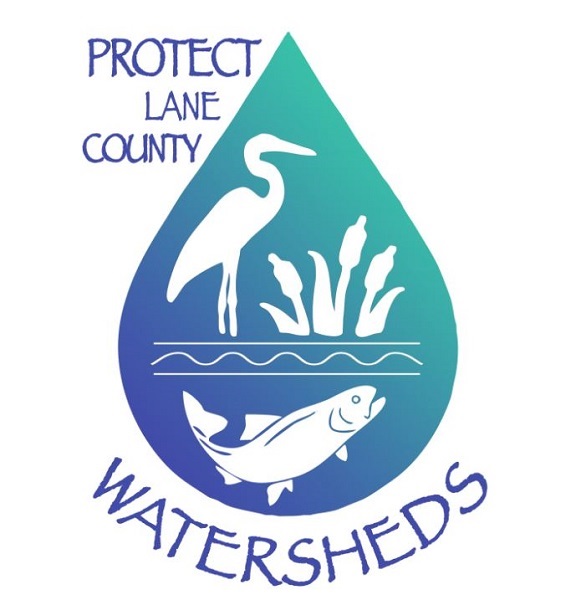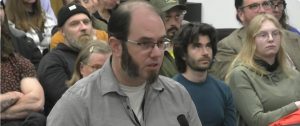Community Rights Lane County seeks to protect local watersheds
7 min read
Jenah’Eve Hartman: This is Jenah for KEPW, 97.3 Eugene Peace Works Radio. I’m with Michelle Holman, Community Rights Lane County.
[00:00:09] Michelle Holman: Thanks so much. I really appreciate you giving me the chance to talk again. This is my second time that I’ve been a guest at KEPW and you’re a really important outlet for people like me and our group.
[00:00:24] We are an organization that empowers communities that are confronted by corporate practices that harm our communities. And we work with our local residents in our local communities to write and pass new laws that place the rights of residents and nature above the rights of corporations.
[00:00:45] Our two initiatives, one was to ban the practice of aerial spraying in the forests, and the other was the right to community self-government, which says, we the people have the right to write and pass laws that protect our health, safety, and welfare.
[00:00:59] Jenah’Eve Hartman: Do you feel that our elected representatives—like the county commissioners—did everything that they could to look after the interests of the community?
[00:01:08] Michelle Holman: Absolutely not. For a good year, we would go to commissioners’ meetings, asking them to just put our initiative on the ballot, which they can do. That’s within their purview. They can do that. They refused. Time and time again they wouldn’t do it. And these people are the public health officers of our county.
[00:01:27] We gave them every opportunity to help us. We told them, ‘Hey, you get it on the ballot. You can vote against it. That’s your democratic right. If you think spraying is a great idea, we’re not asking you to endorse the initiative. We just want it in front of the people. Give the people the chance to say Yea or Nay.’ And they wouldn’t do it. They were incredibly cowardly. And it was a major, major, major disappointment.
[00:01:53] Then when we went to the Supreme Court to try to get them to hear our cases, we asked county commissioners to write amicus briefs, which is like a ‘Friend of a Court’ letter that goes to the Supreme Court to get them to consider whether they’re going to hear our case or not. And we couldn’t even get them to do that.
[00:02:10] And we had a number of really great people who were willing to write those briefs, but our own elected officials completely unwilling to help. When we needed them most, they refused to show courage and conviction. They just, they were a supreme disappointment.
[00:02:25] Jenah’Eve Hartman: What is your reaction to the Oregon Supreme court decision to not hear your two cases?
[00:02:31] Michelle Holman: We were disappointed that the Oregon Supreme Court did not decide to hear our cases. We were not surprised. We— honestly, we do this work to expose how the system is so tone-deaf to the people. We knew that they wouldn’t take our cases. They rarely are standing up for the little people. Yeah, we were disappointed and not surprised. We expected it. And we are using this experience to further demonstrate how the system doesn’t work for the people. It works for the corporations and the big money.
[00:03:07] Jenah’Eve Hartman: I’m trying to remember the name of it…Oligarchy. We just learned about it. Yeah, Oligarchy and tyranny.
[00:03:15] Michelle Holman: Yeah. And we are really the frogs in the boiling water. It’s like, ‘Oh, it’s bad.’ ‘Well, it’s a little worse.’ Well, yeah. I mean, we somehow adapt to a situation that really is so unjust. And I think it’s really important that we learn about oligarchy and the tyranny that is inherent in a system like the one we live in.
We like to call ourselves a democracy. Nope. There is no democracy in the U.S. Democracy says that you’re listening to the people. Do you feel like the people are being heard? Because we sure don’t. And our representatives, they’re in bed with big corporations. That’s how they get elected and reelected. We feel like power’s in the people’s hands. And there’s more of us than there are of them, and that’s why we keep doing this work.
[00:04:05] Jenah’Eve Hartman: Yeah. I was about to say, there’s no democracy. They might say it’s democracy, but really, probably not.
[00:04:12] Michelle Holman: Probably not. And the people, we’re a branch of the government and we are not really acknowledged as such. I mean, this is the work that we do to get to say that we have the right to write and pass laws that protect us. We really do not have that right. We have the initiative system in this country, but we’ve been at this, trying to get them to stop spraying us, well, for a really long time, since the (19)70s. But our specific initiative, we’ve been working on it since 2014 and can’t even get on the ballot because timber interests really do have way more sway.
[00:04:48] And that’s what you find when you do this work. It’s really important for people to understand that the system doesn’t care about you. And that’s why we do this.
[00:04:56] Jenah’Eve Hartman: What are the next big projects for Community Rights supporters in Lane County?
[00:05:01] Michelle Holman: Well, we do have a new initiative called Protect Lane County’s Watersheds. And so instead of the ban to stop a practice, we want to protect what we have, which is our precious water resources.
[00:05:17] We feel like this is maybe a more accessible issue because incredibly a lot of people do not know that the forest gets sprayed with toxic herbicides. I live in the forest. I know about it. It’s an issue for me, but I’ve met a number of people in Eugene who don’t know it. And their water actually is being sprayed because Eugene’s water comes from the McKenzie, there’s a lot of logging and a lot of replants and after you replant, they spray. They spray, they spray, they spray. So it really is an issue for Eugene residents.
[00:05:52] We’re using this new approach with the Protect Lane County Watersheds initiative to get people to think proactively: What can we do? And this would create a situation where big corporate interests would not be able to destroy our waters.
[00:06:08] Jenah’Eve Hartman: It would make sense that some of the people in Eugene wouldn’t exactly know about the spraying, but I knew since I was an itty-bitty baby and that’s mostly because of my grandma, but like, I still knew. My grandma’s like, ‘They sprayed the forest,’ and I’m like straight up as a four-year-old, I’m over here, ‘That’s not good.’ (Right! Right, really.) I’m like, ‘That’s not good.’
[00:06:34] Michelle Holman: Not good. Nope. Nope. And there are apologists for the chemical spray, they’ll say, ‘Well, you know, the government tested these substances and they say it’s safe to use.’
[00:06:46] And you people who are anti-spray are just alarmist and you don’t trust your government. Well, no, we really don’t. Because somebody is making bank on us and our health. And we know that it’s not good for us. It’s not good for the fish. There’s no way that we can turn a blind eye to this practice.
[00:07:04] So, with Protecting Lane County’s Watersheds initiative, there’s the possibility that we will raise the conversation about protecting our waters. What can people do? I can’t think of anyone who would say we shouldn’t protect our waters. There’s plenty of loggers who want to protect the water. For years before there were chemicals, great-grandparents were loggers, and they took down trees and they replanted and they didn’t use poisons. Year after year, we’re having more poisons and more poisons in our watersheds, and this just has to stop.
[00:07:35] This is another way to protect our watersheds and to stop spraying.
[00:07:39] Jenah’Eve Hartman: What keeps you doing this work with passion and determination, despite the uphill battle nature of the odds?
[00:07:45] Michelle Holman: Well, there is a lot of injustice in the world. And I was raised that when you see something, you say something and that does definitely drive me to continue this work. I’m definitely passionate about playing a role, I feel, like my ancestors before me, there’s so many good people upon whose shoulders I stand, that I can’t unsee what I see. I know there’s problems in the world. And I really see our system of government as being tone-deaf to the people, and that we need a different system.
[00:08:20] There are laws in place to keep people disempowered. All of the crazy harmful practices that deny the majority of people the right to health, safety, and a good life—All of those practices are legal. They are protected by law. And so what we say is: If a law is doing harm, then it should be replaced by a law that erases the harm.
[00:08:48] Article One, Section One of the Oregon constitution says: ‘All power is inherent in the people… and they have at all times a right to alter, reform, or abolish the government in such manner as they may think proper.’ That’s in your Oregon constitution. I bet, Jenah, you never heard that in your school. I mean, I never did.
[00:09:08] Jenah’Eve Hartman: I have not heard that in my school before.
[00:09:10] Michelle Holman: That really bolsters our efforts. It makes us feel like, ‘Yes, we have the right, and we have to use the right, or we lose the right.’ That’s why we do this kind of work.
[00:09:21] Go to CommunityRightsLaneCounty.org. There’s a way to get involved and I really urge people to join us. The best thing to do really is to come to a Community Rights Action on the third Monday of every month. So hey, bless up. Big love. Thanks so much.
[00:09:39] Jenah’Eve Hartman: Yeah. Thank you, Michelle for coming on to KEPW and letting me interview you.
[00:09:45] Michelle Holman: You’re welcome.



